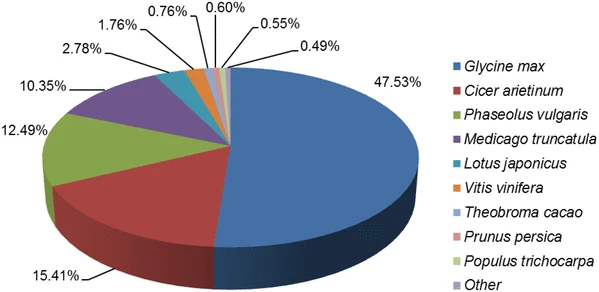Plants in the genus Ammopiptanthus are relic trees of the Tertiary period that have survived dramatic climate change in the Central Asia dryland. Currently, the only two remaining Ammopiptanthus species, A. nanus and A. mongolicus, are distributed in distinct arid regions. Comparative analysis between the two species recently facilitated our understanding of speciation and their different adaptation mechanisms. However, lack of nucleotide sequence data hindered the functional genomics research on A. nanus and comparative transcriptome analysis between the two Ammopiptanthus species.
In a recent study, scientists utilized RNA-Seq to characterize the A. nanus transcriptome and then performed a comparative transcriptome analysis between the two species. A total of 69,990 transcripts were assembled from 93 million clean reads of A. nanus, and more than 78% of these transcripts were annotated. A batch of miRNA precursors was predicted and thousands of potential simple sequence repeats were identified. A total of 6606 pairs of putative orthologs with full-length coding sequences were obtained using reciprocal blast. Based on the rates of nonsynonymous (Ka) to synonymous (Ks) substitutions, the divergence time between A. nanus and A. mongolicus was calculated to be approximately 0.70 ± 0.62 Mya. They identified 15 rapidly evolved genes that likely experienced positive selection; these genes are mainly involved in plant defense, epigenetic regulation, and plant development.
These results provide results provide a comprehensive transcriptomic dataset for A. nanus and advance understanding on the evolutionary adaptation of the two species to their individual arid habitats.

Related Service
RNA Sequencing Service – LC Sciences provides a one-stop solution (i.e. from sample to data) for RNA-Seq using the latest in rna sequencing technology. The RNA-Seq services provided by LC Sciences are comprehensive and provide the most complete picture of RNA content in your samples. We can help you set up and conduct a high-quality, well-controlled RNA-Seq experiment based on the latest deep-sequencing technologies [Learn more…]
References
F. Gao, H. Li, Z. Xiao, C. Wei, J. Feng, Y. Zhou (2017) De novo transcriptome analysis of Ammopiptanthus nanus and its comparative analysis with A. mongolicus Trees doi: 10.1007/s00468-017-1631-6 [abstract]
